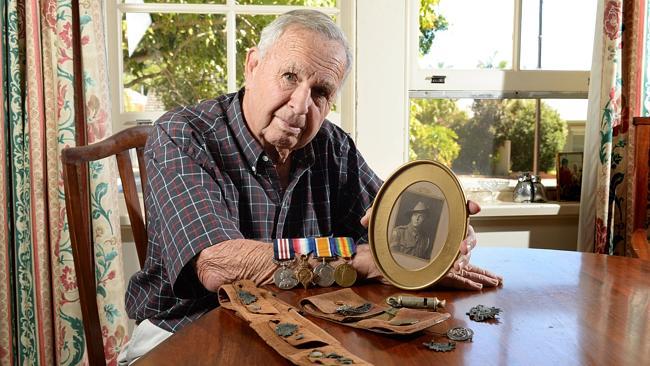Frank Wood’s Gallipoli torment painstakingly pieced together in WW1 records room in Canberra
A South Brighton man has uncovered the heroic details about his father’s war efforts as part of the fierce 10th Battalion during World War I.

National
Don't miss out on the headlines from National. Followed categories will be added to My News.
FRANK Wood stood beside his brother William on the beach at Gallipoli and watched as he was shot down by enemy fire.
The pair was part of the 10th Battalion storming the Turkish beach on August 6, 1915, joining the eight-month siege of thousands more young Australian men who would never return home.
William, 21, was buried at Beach Cemetery and Frank, 19, went on to become a hero.
He survived the bloody battle and many others during the three years he was at war but he never spoke of the horrors in the trenches or losing his closest sibling.
He did not get through the war unscathed, and spent almost a month recovering from wounds from the Battle of Pozieres, in Birmingham, UK.
His son, Brian Wood, did not learn of his father’s heroism until long after his death in 1948, aged 53.
Much of what Brian has discovered about his father’s time fighting in World War I has been pieced together with paperwork stored in Canberra.
The South Brighton family has Frank’s collection of medals, including his Military Medal, a few pouches and the whistle Frank would blow to get the troops firing out of the trenches.
The remarks recommending Frank Wood for his Military Medal said he led his section “with great brilliancy” during a raid on Celtic Wood, east of Ypres, on October 9, 1917.
It told of how Wood carried one of his men to safety after he was badly wounded, all while under heavy enemy artillery and rifle fire.
“His courage was admired by all who witnessed his work,” the transcript said.
The soldier, Private AH Buck, a 26-year-old Kangaroo Island man, died on the way back to camp and Wood assisted in his burial that night.
After the courageous act, Wood was promoted to Sergeant.
It would be another year of traversing through Belgium before Wood was sent home to the small town of Ramco, near Waikerie.
His daughter-in-law, Judith Wood, said he was welcomed home at a dance at a Waikerie tennis court, with violin and piano music playing well into the night.
“He was still recovering from the war when he returned,” Mrs Wood said.
“People have told us he seemed worn out.
“He never spoke about his time at the war, we didn’t know really anything about what he did until a few years ago.”
Mr and Mrs Wood travelled to Canberra to inspect Frank’s war records and their daughter, Julie, visited Celtic Wood, and Private Buck’s grave, in 2013.
Frank is buried at Adelaide’s West Tce Cemetery.
This story is part of Messenger’s 100 Years, 100 Days, 100 Stories project, which will profile 100 South Australian World War I heroes as the nation builds up to the centenary of the Allied landing on Gallipoli on April 25, 1915.
If you have the details and war record of a family member who served during World War I, let us know. Please go to your local Messenger’s Facebook page and send us the details.
Originally published as Frank Wood’s Gallipoli torment painstakingly pieced together in WW1 records room in Canberra


